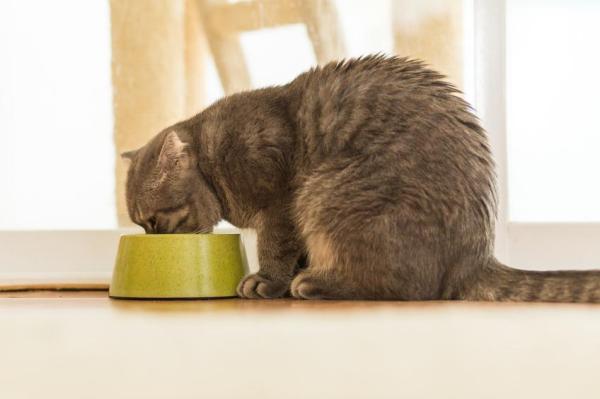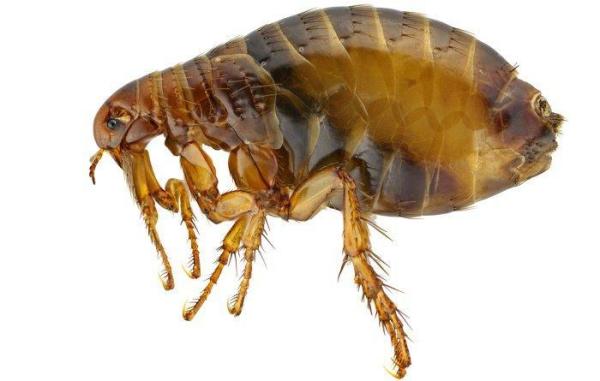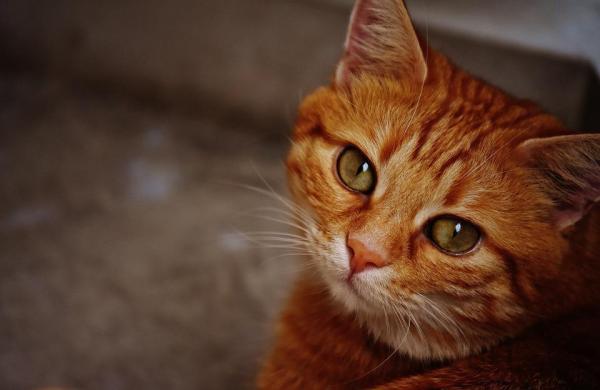
Cats have a well-known and accurate reputation of being hygienic animals. Not only do their grooming habits keep their coat clean, but they can help prevent disease and parasitical infestation. The amount of time they devote to grooming can appear to be excessive, but a healthy cat can spend large portions of the day attending to any patch of fur within tongue reach. However, a healthy cat will not pull out their hair for any reason.
At AnimalWised, we look at why your cat is pulling out their hair and what you can do to stop it. To understand the reasons why a cat is harming themselves in this way, we need to know what is triggering the behavior.
Reasons why your cat is pulling out their heair
How easy it is to see if your cat is pulling out their fur can depend on the cat. For example, if you have a long-haired cat such as a Persian-type cat, you might not notice patches missing. If we don't see the cat enough, we may not be able to witness the behavior and think that any missing hair might have fallen out naturally.
If we suspect out cat is pulling out their hair, we should look for patches of hair missing. We might notice this from seeing clumps of hair around the home or even if the cat is gagging more often due to the presence of hairballs. You should also observe them during their grooming routine to see if they are chewing and biting at their fur.
Determining the difference between normal and problem grooming may not be easy at first. However, when a cat is pulling their fur out, you can see they are using excessive force. Eventually patches of skin where hair is missing will appear which are likely to have abrasions or open wounds.
Once you have determined that a cat's hair loss is due to them pulling their fur out, you will need to understand why they do this. The main reasons are related to:
- Environmental factors
- Food allergy
- Parasites
- Stress
- Disease
Before we look into detail about the causes of a cat pulling their hair out, we need to point out one of the most important factors in determining this cause. This is to know your cat. Part of sharing a life with a feline involves getting to know their personality and behaviors. These include their grooming habits. We need to be sensitive to changes in their grooming habits in case it is a sign of an underlying physical or psychological problem.
Although often related, it is important to differentiate between a cat pulling out their hair and a cat's hair falling out on its own.
Environmental factors
As with humans, it is possible your cat is allergic to certain elements found in their environment. If we see a cat licking their fur excessively and pulling out fur, it is possibly due to an allergy. The excessive grooming is often a way for the cat to try to relieve the frustrating itchiness caused by an allergy.
Cats are most often allergic to elements in their environment which may include pollen from plants or dust mites. If the cat suffers reactions in the spring and summer, it is possibly pollen related. Allergies can also be caused by chemicals found in cleaning products or even feline application products. For example, it is possible a cat can be allergic to certain flea treatments.
Even with the use of laboratory tests, it is often difficult to diagnose an allergic reaction in cats. To help isolate the cause, you should:
- Avoid the use of aerosols, candles and similar products near the animal.
- Vacuum the house weekly to remove dust and mites.
- Go to the vet to prescribe necessary medications to relieve irritation and itching.
- Distract your cat with games so that they do not try to pull hair from the affected area.
- In case of skin infection, wash the area twice a day with saline solution.
The most important action you need to take is to bring the cat to a veterinarian. They can perform preliminary diagnostic tests and provide the right level of advice.

Food allergy
Some cats can develop allergies to the food that is given to them. The symptoms of food allergies in cats can be varied and commonly involve vomiting and diarrhea. However, it is also possible that skin reactions can be caused due to food allergies. Cats lick the area to alleviate discomfort and may pull hair out in the process.
Since there are few conclusive laboratory tests for feline food allergies, you will need to work with a veterinarian to apply dietary changes to determine the problem. You may have noticed hair pulling after changing their food, so this can point to a likely cause.
The substance in question can take up to 8 weeks to completely leave a cat's body. It may be enough to eliminate certain foods or change brands. However, it may be necessary to change their diet completely, such is the case with hypoallergenic cat food.
parasites
The presence of external parasites, such as fleas and ticks, will cause the animal to itch. The result is that the cat will scratch themselves to relieve the irritation. If they are still in discomfort, it is not uncommon for them to lick and bite their skin.
When the parasite sucks blood from the cat, its saliva enters the feline's body. This is a powerful allergen which causes itching. The presence of fleas on cats is easy to notice. Not only are they visible with the naked human eye, but you will see the accumulation of black residue on the cat's coat. They are extremely dangerous as they can be the vector of various diseases such as feline anemia.
When you see the presence of fleas you should go to the veterinarian to assess the situation and be prescribed the correct product. They will likely provide medicated flea treatment shampoo as well as deworming agents to prevent further infestation. Similarly, you will also need to clean the cat's environment with a spray to kill to fleas and their eggs.
Ticks and other parasites will also need to be treated in a similar fashion. However, ticks latch on to the cat's skin in a particular way. For this reason, you will need to remove the tick from the cat's skin without harming the animal.

Stress
Cats are prone to stress when faced with a change in their environment. One of the ways to show this may be to start pulling their hair out. When the cat licks their fur, it releases endorphins. These are hormones that make them feel reassured and more relaxed. When the cat encounters stressful situations, it is possible they will start to overgroom as a means of dealing with their anxiety.
Since environmental changes are the most common causes of stress in cats, we need to assess the context of the cat's behavior. If their family have gone on vacation, there is a new member of the household (whether human or animal), there is a neighbor cat harassing them or even moving around items in the home, the cat may develop symptoms of stress.
If you ar eon vacation, the situation should improve when you return. This is even though they may act weird for a little while to readjust. However, other causes of stress in cat will need a full reassessment of their circumstances. For example, they will need to be reintroduced to the new family member and encouraged to get along. This is the same if the new member is another cat or even a human baby.
There are other causes of stress in cats. If you are inflicting trauma on them, they will become stressed. This may even not be on purpose. Cat guardians often handle or play with their cat too roughly without considering the adverse reactions it can cause. Even boredom can lead to stress, so you need to ensure the cat is properly physically and cognitively stimulated.
Disease
Your cat may be manifesting the symptom of a physical ailment if they are puling out their hair. This is the case with:
- Fungal infections
- Viral infections
- Bacterial infections
- Kidney stones
- Urinary infections
- Immune system deficiencies
In many of these cases, the problem is that the cat is pulling their hair to relieve pain. We need to consult a veterinarian to determine the root cause and provide the correct treatment.

Tips on preventing your cat pulling their hair out
- Never assume that your cat pulls their hair on a whim, as there is always a reason behind this behavior.
- In the face of any unusual behavior, see your veterinarian for guidance in looking for possible symptoms to help determine the root of the problem.
- When bringing a new animal into the home, introduce them calmly. The adaptation process is not easy for some felines, but with patience you will achieve it. If they do get into a fight, avoid leaving them alone until you are sure they won't hurt each other.
- Play with your cat. Never interrupt their sleep cycles, but take advantage of the waking hours of the day to amuse them for a few minutes. This can help relieve any stress.
- Consult your veterinarian about the possibility of placing pheromone diffusers in your home, as they calm felines.
- When you notice that your cat is grooming themselves without hurting, offer treats and praise so that it associates this with a desired behavior.
- During vet-prescribed treatment (if any), you may need to put an Elizabethan collar on your cat to make it difficult for them to access the affected areas. See how they feel with this new object, because if it bothers them it will only increase stress levels.
This article is purely informative. AnimalWised does not have the authority to prescribe any veterinary treatment or create a diagnosis. We invite you to take your pet to the veterinarian if they are suffering from any condition or pain.
If you want to read similar articles to My Cat Is Pulling Out Their Hair - How to Stop It, we recommend you visit our Other health problems category.